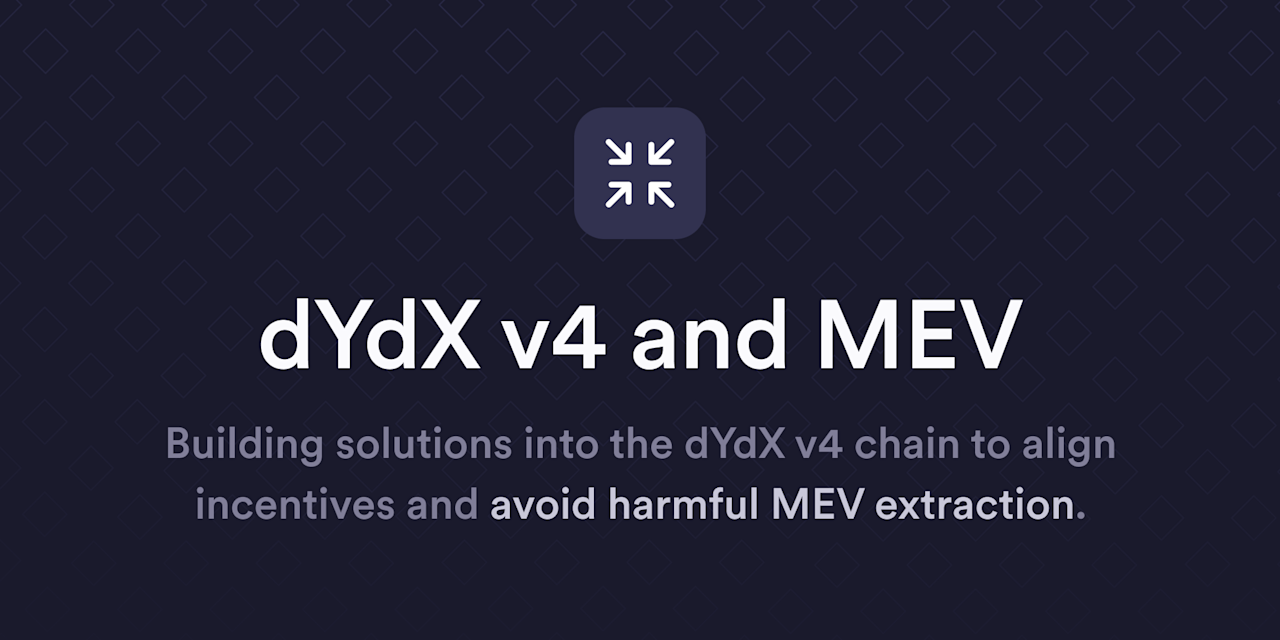


tldr;
dYdX v4 open-source chain software’s fully decentralized and performant in-memory orderbook could lead to MEV extraction; this is being proactively addressed
Unlike general purpose smart contract environments, the Cosmos infrastructure enables us to build unique MEV solutions that align a validator’s incentives with a user’s incentives. We are actively working on researching and building these solutions, and plan to allocate significant resources towards doing so going forwards.
MEV behavior could be detrimental to the product experience.
v4 and MEV
The dYdX v4 chain open-source software (“dYdX Chain”) is designed to offer users the best trading experience with zero gas fees, low latency, high throughput (similar to a centralized exchange) and deep liquidity. To get there, the dYdX Chain uses an in-memory orderbook where only filled orders are committed to consensus (i.e., off-chain). This could lead to MEV extraction through both novel and well-established vectors, which we are addressing right from the start. We plan to release more specific posts detailing what we are building to address MEV soon.
What is MEV?
MEV refers to profits that validators can earn by reordering or censoring transactions to their advantage. This can have a negative impact on end users as it can adversely affect pricing. When designing dYdX v4, we explored different strategies used in the crypto ecosystem to reduce the MEV risk and protect potential end users.
Ethereum vs App-chains
In the Ethereum ecosystem, a neutral approach is taken towards MEV, and a Proposer-Builder Separation (PBS) approach is used to auction off the block space. PBS mitigates the centralization risks of MEV by requiring searchers to redistribute their MEV profits to participants within the PBS supply chain. However, in PBS, MEV still hurts average users. In contrast, the Cosmos ecosystem, particularly Osmosis, has taken a more opinionated stance towards MEV and aims to mitigate any harmful MEV and capture any benign MEV it generates. For more background, we recommend reading this document by Reverie. This is an example of additional vectors app-chains can take towards addressing MEV. We are actively researching both existing and novel mitigations that are uniquely enabled by dYdX being a sovereign open-source chain software.
Our Choice to Prioritize User Experience
Our goal at dYdX is to offer the best product experience on the dYdX v4 chain software. The decision to use the Cosmos infrastructure enables us to create a fully decentralized exchange while also maintaining high performance. The Cosmos Infrastructure also allows us to build unique MEV solutions into the dYdX v4 chain software. It enables flexibility in orchestrating how blocks are constructed and what MEV looks like on the chain, and all of this can be built into the protocol code itself. We believe that this a better approach as it properly aligns the incentives of a validator and the end user through an on-chain solution. This differs from general-purpose smart contract environments where validators are neutral towards the needs of application users. Our approach could prevent validators from profiting at a user's expense. Such behavior is detrimental to both the protocol and community. As part of this effort, we have been working closely with MEV experts such as Skip Protocol and ChorusOne to develop MEV mitigation strategies for the dYdX v4 chain software. We plan to release more details on this in the coming months leading up to the mainnet open-source software release.
To learn more about our plans and for the most recent updates regarding dYdX, join us on Discord and Twitter.
About dYdX and Terms
dYdX is the developer of a leading decentralized exchange on a mission to build open, secure, and powerful financial products. dYdX currently runs on audited smart contracts on Ethereum, which eliminates the need to trust a central exchange while trading. We combine the security and transparency of a decentralized exchange, with the speed and usability of a centralized exchange.
Terms and Conditions: This post is subject to the dYdX Terms of Use. The dYdX interface and products are not available to persons or entities who reside in, are located in, are incorporated in, or have registered offices in the United States or Canada ("Blocked Persons"), or other Restricted Persons (as defined in the dYdX Terms of Use). dYdX products and services are not intended for, and should not be used by, Blocked Persons or Restricted Persons. Terms of Use specific to v4 software can be found here.